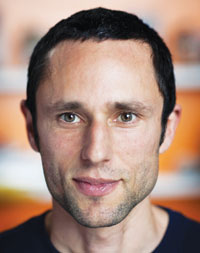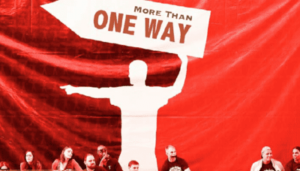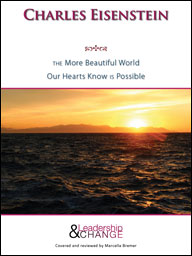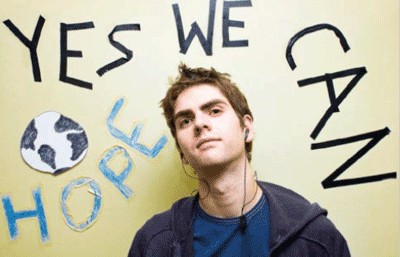
We’re living in a story of Separation – says author & speaker Charles Eisenstein, a Yale graduate in Philosophy and Mathematics. The world’s current environmental and social problems derive from this Separation narrative that directs our mindsets and behaviors. Eisenstein’s book “The more beautiful world our heart knows is possible” is a guide towards a new story, aimed at connecting or “Interbeing”. The new story sees the whole instead of the separated parts; it urges us to connect with each other and with nature, to serve the common good and to exclude no one.
Judging by its cover, organizational professionals might think this book too spiritual. So, is it relevant for leaders and change consultants? I think so. Here’s the philosophical, historical, broad overview of how we are changing. As we change, our workplaces change with us. It has parallels with Otto Scharmer’s “Leading from the Emerging Future”
Eisenstein’s visionary book is wise and disruptive. It provides so much food for thought that I created a white paper and I invite you to a dialogue. Members can download this white paper and share their thoughts in the members area.
“We’re close to a profound transformation of consciousness and being. If I can see it, as an ordinary man, we must be almost there.” – Charles Eisenstein
Story of Separation
Eisenstein shares the “Story of Separation” as it was taught in his youth: humanity was destined to create a perfect world through science, reason, and technology; to conquer nature, transcend our animal origins and engineer a rational society.

The story brought great material wealth to the industrialized world, but it didn’t feel good to young Eisenstein: “We were not supposed to hate Mondays and live for the weekends and holidays. We were not supposed to have to raise our hands to be allowed to pee.”
We once thought economics would fix poverty, political scientists would fix social injustice, chemist and biologists would fix environmental problems, and the power of reason would prevail. But it didn’t. Now we have lost this perfect-world-through-science vision we once had – many people have no vision of the future at all. Rebellion, addiction, self-sabotage, procrastination, laziness, rage, chronic fatigue, and depression are all ways that we withhold our full participation in modern life. The science story doesn’t feel true anymore. Our narrative is crumbling. Our systems of money, politics, energy, medicine, education are no longer delivering the benefits they once did.,
Who could have foreseen, when the story of science and progress was still strong, that the 21st century would be a time of school massacres, of rampant obesity, of growing indebtedness, of pervasive insecurity, of concentration of wealth, of unabated world hunger and of environmental degradation that threatens civilization?
Old-science beliefs and answers
This “story of separation” that led to our material wealth and technological progress is based on mechanistic science that still determines our view of what is real, possible and practical. The new “quantum” sciences are not yet integrated into how we see the world.
Our culture offers answers to life’s questions – based on mechanistic science:
Who am I?
– You are a separate individual in a universe that is separate from you.
Why do things happen?
– The impersonal forces of physics act upon a generic material substrate of fundamental particles.
What is the purpose of life?
– There is no purpose, only cause. We must live, survive and reproduce.

What is human nature?
– To protect ourselves against the hostile universe of competing individuals and impersonal forces, we must exercise as much control as possible.
Who are we as a people?
– In our mechanical universe, we alone possess consciousness.
Where did we come from and where are we going?
– We started out as animals. We conquered nature. Our destiny is to free ourselves from labor, disease, and death if possible…
This story of separation permeates our culture. Our organizations are aligned with these principles: we compete for scarce resources in a hostile marketplace, we must survive and exercise control and use effort to make things happen – we are different than other organizations and departments – we are separate leaders and change consultants – trying to survive.
The More Beautiful World – a New Story
But what would a new story entail? Eisenstein observes an emerging story of Interbeing. This new story yields different answers, beliefs, and behaviors, based on the new quantum sciences, and our ongoing personal development:
– We are connected on a quantum level, which goes beyond “mechanistic” interdependency. What we do unto another, we do to ourselves.
– Each of us has a unique and necessary gift to the world. The purpose of life is to express our gifts.
– Inside and outside mirror each other.
– Every act is significant and has an effect on the cosmos. No matter how small – the quantum particle influences the universe or the field.
– Purpose, consciousness, and intelligence are innate properties of matter and the universe.
People are connected, argues Eisenstein, because it hurts to see another person suffer. “Modern individuals can be safe and have everything they need – and still be not satisfied. Distanced from the dying forests and hungry children, we do not know the source of our pain. We purchase new things, entertain our addictions, strive for ideals – but in moments without doing and distraction, which we call boredom, we feel that discomfort.”
We also have a desire to serve something transcending the separate self. We are interbeings – longing to belong to the whole. We are each other, and we are the world.
Cynicism – fear and doubt
Eisenstein is honest when he admits his own cynicism: “Even as I tell the new, emerging story of Interbeing, part of me stays in the story of separation. Part of me thinks: Yeah – right.”
“I’m not an enlightened guru – that’s an old hierarchical model. But when you meet a cynical critic, inside or outside of yourself, remember that cynicism comes from a wound of crushed idealism and betrayed hope. Be compassionate, because opening yourself is making yourself vulnerable for disappointment. But the cynic mistakes cynicism for realism.”
That’s just like Scharmer’s Theory U: we need to pass the voices of judgment, cynicism, and fear. We gather data and start to diagnose and understand a situation – before we arrive at stillness and truth (at the bottom of the U) from which we can start to create new things.
So, what would happen if more people would believe in and act according to the story of Interbeing in which no action is insignificant? Because small causes can have huge effects? (Also read my free white paper when you sign up for blog updates: The Make Your Difference Framework). The world would change!
- How would your work change if you act according to the new story of Interbeing?
- What would you do if it mattered what you did?

Which story is true?
But which story is true, Interbeing or Separation? Interbeing is no less evidence-based or rational than Separation. But we often arrange evidence to fit our beliefs. No evidence is ever enough, says Eisenstein, if you don’t believe it.There is always another explanation for what happens: coincidence, wishful thinking, etc. So, it’s up to you to decide:
- Which story is helpful and more aligned with who you are and want to be?
- Which story energizes, engages and empowers you to act as a change maker?
It’s hard to be open to new possibilities because we are used to our money system that stimulates competition, scarcity, alienation from nature and dissolution of community. Our economy converts nature into products and relationships into services. We associate money with security, survival, and comfort. We have to use force to make things happen; we need to control people and things in our linear, hostile world. Everything is fragmented and separated – and we have learned the mindsets of scarcity, struggle, and judgment.

Linear force and control
To make something happen in our Story of Separation, you need to use force. In the universe lacking will or intelligence of its own, things never just happen; they only happen if something causes them to happen and cause means force.
Likewise, when we are brought up, we need to adjust to the parent, the group, the teacher and be good boys and girls. We learn conditional self-approval and thus, self-rejection. We need the self-discipline to obey and do our tasks. The group uses force, guilt and shame to keep us tamed.
But when human beings are boxed in, surveilled, scheduled, assigned, classed and compelled, they rebel in all kinds of ways. Thus, it is confirmed: we need to control people, including ourselves.
Let’s look at the new science and a different understanding of cause and effect. Maybe you believe that nothing I can do as an individual, may be enough to make any difference to a large system. But our notions of practicality, realism and causality are grounded in “old” physics. Enter quantum physics: where particles behave randomly – there’s a-causality. Nothing makes them happen; they happen. Photons choose where they’ll be.
Quantum defies the separation between self / other, observer / observed and object / universe because the observer seems to influence where the observed will be, and everything is connected. If this is true, what you do will make a difference.
Global warming: example
 Can the climate activist underpay his janitor and neglect his children? It doesn’t matter in the story of separation – but it does when interconnectedness applies. Small things matter just as much as large projects, from a quantum, systemic, non-linear perspective.
Can the climate activist underpay his janitor and neglect his children? It doesn’t matter in the story of separation – but it does when interconnectedness applies. Small things matter just as much as large projects, from a quantum, systemic, non-linear perspective.
“What kind of human being is politically passive, votes from fear and hate, pursues endless material acquisition and is afraid to contemplate change? Well, that’s us, who are cut off from nature, cut off from community, financially insecure, alienated from our own bodies, immersed in scarcity, trapped in a tiny, separate self that hungers for its lost belonging. We can do no other than to perpetuate these behaviors and systems that cause climate change.”
But the old ideology of control says that if we can only identify the cause, we can control climate change. Likewise, in linear thinking, a large problem needs a global, abstract approach to fixing it.
This is the logic of the separate self in an objective world: What you do, would matter if everyone did it – but since everyone isn’t doing it, what you do doesn’t matter… So take your car instead of your bike, toss the plastic wrapping away, put on the central heating instead of your sweater – because it doesn’t matter when the others don’t change.
Small actions, fields, and flow
By the same logic, people squelch the expression of their unique gifts by thinking they must do something big with them. They think their actions are not enough – one must write a book that reaches millions. This thinking invalidates the small, beautiful strivings of the bulk of humanity; invalidates the very things that we must start doing en masse to sustain a livable planet.
From the perspective of Interbeing, actions are never small. They can even be invisible to take effect, argues Eisenstein. This is because of “morphic resonance”, a term coined by Rupert Sheldrake. He showed that if something happens somewhere, it induces the same thing to happen elsewhere. Once I’ve solved a problem, it becomes easier for others to solve it too, no matter where they are and without contacting me.
Eisenstein believes in the ripple effect of changed people who change people – through mechanic cause and effect but also through Sheldrake’s “morphogenetic fields”. You’ll change the system or the field – even by doing something that goes unnoticed.
Be or Do something?
While we’re here, contemplating quantum science and philosophy – the world is hungry and warming up. Your team is waiting, and you should make money with your next project. Quick, stop reading this: get up and DO something!
Doing is the habit of the western world. As activists would say to spiritual people who aim to change the world: Get off your meditation cushion and do something! But without deep work on yourself, how can you avoid re-creating your internalized oppression in all that you do? What will the quality of your actions be?
Spiritual people would say to the activist: first BE the change you want to see in the world. Just work on yourself and the world around you will change – through the quantum field, through small things that turn out to be huge.

This aligns again with Theory U, where we observe and sense deeper and deeper, going down the left-hand side of the U, until we receive a vision of what wants to happen, and we can act in an instant. That action, if truly sensed in this deep, still understanding, will be effective.
We need to Be, and we need to Do, but both at the right time.
Urgency
Shouldn’t we all jump into action right now to save the world? Or to create better organizations? When we don’t know what to do, it might be counterproductive to do so. Frenetic action placates the conscience, creating the illusion that you are part of the solution, but are your actions doing any good?
Hurrying is part of the Separation mindset, explains Eisenstein, who quotes ancient Eastern wisdom to remind us:
There is a time to act, and a time to wait, to listen, observe.
When the time comes to push, the urge to push is unstoppable.
Overcoming scarcity
The story of Separation also fosters the habits of scarcity, judgment, and struggle. We need to do inner work and free ourselves from these mindsets to BE the change we want to see in the world.
How can you contribute to changing your organization from the inside? How can you conduct a revolution of love and support diversity, respect, dialogue, and sustainability in organizations?
Charles Eisenstein is an author and speaker who graduated from Yale University in 1989 with a degree in Mathematics and Philosophy and spent ten years as a Chinese-English translator. He’s also the author of Sacred Economics and Ascent of Humanity.
He explains the New Story (22 minutes): https://www.youtube.com/watch?v=Mjoxh4c2Dj0
Marcella Bremer is an author and culture & change consultant. She co-founded this blog, the Positive Culture Academy, and ocai-online.com.
7 Responses
good idea thnx
Hiding in plain sight.
Thanks for sharing this perspective and presenting it in the context of the individual and organization.
Definitely an article in need of further reflection (vs action). Invites quite that paradigm shift.
I’m glad that this inspires further reflection for starters, Scott. Yes, it is a paradigm shift and I’m curious to see where this goes…
I’ve been familiar with this “Separation” concept before, but it seems to me that Eisenstein is making quite a lot of assumptions in his assertion that this story is characteristic of Western culture. I’m curious to know what ethnographic studies, what narrative studies, etc. might back up this generalization. Also, he’s setting up the age-old Western world/Eastern world dichotomy, exoticizing “Eastern” culture by claiming it to have wisdom that can “cure” Western society. It doesn’t acknowledge the myriad complexities that exist, not to mention that there are far more than just two cultures in the world. What he’s saying sounds nice on the surface, but doesn’t really go deep enough to suggest real-world applications. Not to mention, there is no evidence whatsoever that we really are connected on a quantum level. I’m not saying that because I don’t want to believe it, but because it just sounds like an easy answer to a series of societal issues that are far more complex than the way he presents them to be. I agree that meditation and slowing down to reflect, etc. are very beneficial and necessary, but he simply doesn’t provide any critical value to his claims.
Hi, Angela – thanks for sharing your thoughts about this post! It’s interesting to see how everyone is unique and how values and perspectives may differ.
I’m personally not disturbed by the lack of displayed scientific evidence which you seem to value more than I. I don’t experience the dichotomy between East and West and other polarities as much as you do – but I have read Eisenstein’s book with all its nuances that may have been diluted a bit in creating a much shorter blog post. Eisenstein’s views resonate with me and inspire me and that’s why I think they are valuable. For me, they do inspire real-world applications. For instance, by becoming even more aware of how we are connected, I am more inclined to give people the benefit of the doubt when they treat me not as I’d like. I’m more conscious of my connection and dependency on nature and natural resources. I’m even more motivated to consume in a conscious way – supporting social, sustainable and great places to work.
Thanks for sharing your more critical viewpoint! This is good to hear because there are multiple ways of seeing the world.
Great article and great points made with Charles quotes in just the right places! I am 65 years young and the last 30 years have proven to me that we are deeply connected at levels science has only begun to tap into. Meditation, yoga, and 20 years training and immersion in Rubenfeld Synergy, body-centered psychotherapy, plus other phenomenal personal experiences left me no reason to wait for science to catch up. My immersion in all this and wanting to understand myself and the behaviors of others led to synchronistic events too incredible to pass off as coincidence. It got to the point where I could literally hear the thoughts of others before they shared them. I now describe our connection as that we are all cells in a larger body, each cell affecting all the others via actions and inactions. And we are connected by an invisible thread that I call Love. When we stay on a course of integrity and regain our true nature by understanding how old unhealed wounds can interfere with our happiness and interactions, we begin to see how Charles Eisenstein’s More Beautiful World is possible.
Agreed! It is possible 🙂